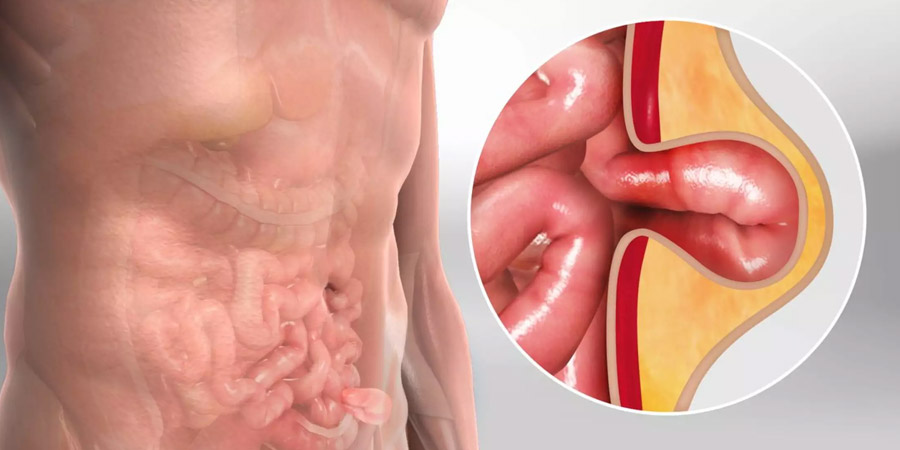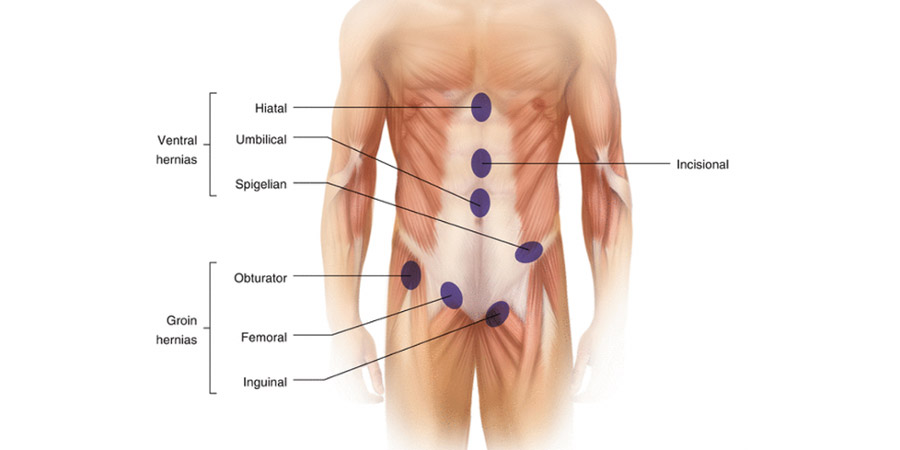
Dr. Pankaj Hans is one of the best Hernia Surgeon & Hernia repair Doctor in Faridabad. He provides the Best Laparoscopic Hernia Treatment in Faridabad, with over 16 years of experience as a laparoscopic surgeon.
A hernia occurs when the contents of a body cavity bulge out of the area where they are normally contained.
Hernias by themselves may be asymptomatic (produce no symptoms) or cause slight to severe pain. The pain can occur while resting or only during certain activities such as walking or running. Nearly all hernias have a potential risk of having their blood supply cut off (becoming strangulated). When the content of the hernia bulges out, the opening it bulges out through can apply enough pressure that blood vessels in the hernia are constricted causing the decreased or total loss of blood supply to the protruding tissues. If the blood supply is cut off at the hernia opening in the abdominal wall, it becomes a surgical emergency as the tissue needs oxygen (which is transported by the blood).
Common types of abdominal wall hernias include the following:
Hernias usually occur in the groin. Inguinal hernias are in the groin and are mostly found in men. Femoral hernias are in the upper thigh near the groin. These are much less common and are mostly found in women. The abdomen is another frequent hernia location. If hernias occur in the midline of the abdomen, they are called ventral hernias. If they occur at the site of a previous surgical scar, they are incisional hernias. Umbilical hernias occur in association with your belly button and are found more commonly in babies.
In a hiatal hernia, part of the upper stomach comes through an opening in your diaphragm, or chest wall. This hernia can cause acid to leak from your stomach into your esophagus. The esophagus is a tube that connects your throat to your stomach. Effects of Hiatal hernias include heartburn, indigestion, and acid reflux.
Hernias also can be birth defects. A congenital diaphragmatic hernia occurs when your diaphragm doesn’t form right. This can create space for your stomach to move into your chest. Sometimes doctors find the defect when you’re a baby. Other times, they may not find it until later in life. In severe cases, your stomach can crowd your chest organs, like your lungs and heart. Surgery can help repair your diaphragm so that you don’t develop other problems, such as breathing difficulties.

The signs and symptoms of a hernia can range from noticing a painless lump to the severely painful, tender, swollen protrusion of tissue that you are unable to push back into the abdomen (an incarcerated strangulated hernia). Abdominal or pelvic pain can be part of the symptoms of many hernias.
Curative treatment consists of surgery. Surgical hernia repair is the ultimate treatment. Laparoscopic surgery has taken the place of traditional hernia surgery for some the abdominal hernias. The timing of treatment of a hernia and technique for treatment depends on whether it is reducible or irreducible and possibly strangulated.
The treatment of every hernia is individualized, and a discussion of the risks and benefits of surgical versus nonsurgical management needs to take place between the doctor and patient.
If a hernia that appears irreducible is finally reduced, it is important for a patient to consider a surgical correction. These hernias have a significantly higher risk of getting incarcerated again
Risk of strangulation: In considering when to have a reducible hernia surgically repaired, it is important for a patient to know the risk of strangulation.
Operative complications: Complication rates vary according to whether the surgery was elective or emergent, the hernia size and location, as well as the techniques used (open surgery or laparoscopic)
Most complications occur over the short term and are easily treatable.
In general, all hernias should be repaired unless severe preexisting medical conditions make surgery unsafe. The possible exception to this is a hernia with a large opening. Trusses and surgical belts or binders may be helpful in holding back the protrusion of selected hernias when surgery is not possible or must be delayed. However, they should never be used in the case of femoral hernias.
Avoid activities that increase intra-abdominal pressure (lifting, coughing, or straining) that may cause the hernia to increase in size.
You can do little to prevent areas of the abdominal wall from being or becoming weak, which can potentially become a site for a hernia. Modifying your behavior and weight loss can help prevent the worsening of the hernia.
Dr. Pankaj Kumar Hans is one of the Best Laparoscopic, Bariatric, Gastro, Laser, Hernia, Gallbladder, Piles & General surgeon in Faridabad, Delhi NCR with over 16 years of experience.
Make an AppointmentCopyright © 2024 Hans Laparoscopy Surgiclinic. All Rights Reserved. Privacy Policy | Terms of Services
Developed by: S Techuniversal